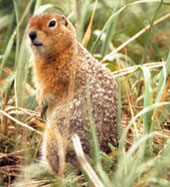The fast-fattening arctic ground squirrel may hold clues to why and how humans become obese
by Kathleen McCoy |
Obesity is a concern in most industrial nations, and especially in the United States where 74.1 percent of the population is either overweight or obese. This condition can be a prelude to some serious illnesses, including type 2 diabetes, hypertension and cardiovascular disease.
The medical costs are astounding, estimated at $117 billion in direct and indirect costs, half of that borne by Medicare and Medicaid. Did someone mention out-of-control health care costs?
 So how can the humble little arctic ground squirrel help with such a serious health
issue?
So how can the humble little arctic ground squirrel help with such a serious health
issue?
Khrys Duddleston, an associate professor in the Department of Biological Sciences at UAA, is finding that out in her lab, examining the microbial community in the intestinal tract of Urocitellus parryii. These squirrels are good for this study because they fatten up fast for hibernation-in only about three weeks time.
 "The fast-fattening arctic ground squirrel may hold clues to why and how humans become
obese" is licensed under a Creative Commons Attribution-NonCommercial 4.0 International License.
"The fast-fattening arctic ground squirrel may hold clues to why and how humans become
obese" is licensed under a Creative Commons Attribution-NonCommercial 4.0 International License.









